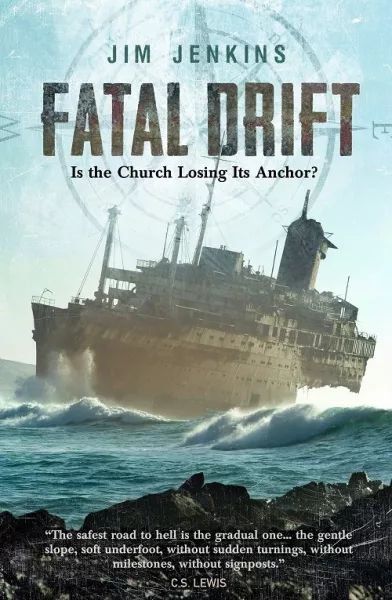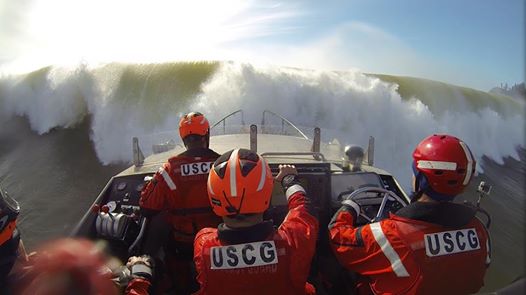The following is an excerpt from my book: Fatal Drift
I have had the privilege in my life to not only pastor for over thirty years, I also for twenty of those years served as a Navy Reserve Chaplain. Navy chaplains in their careers can expect to serve in Navy, Marine Corp and Coast Guard units—all the sea services. While serving with the Coast Guard I had the responsibility as one of the only reserve chaplains to the boat stations and the air stations on the Oregon Coast.
I would train with the ‘Coasties’ as they prepared themselves to cross the bar to rescue a distressed mariner. I would fly with them as they trained to conduct search and rescue missions.
Once I was in the hangar of the air station sitting through a briefing on the possible problems to do with the Y2K panic. The alarm went off and all the air assets were immediately deployed. A supertanker had run aground and the crew needed to be airlifted off.
This was a potential Exxon-Valdez moment.

I was not allowed to fly with them on missions like this, so instead I went to the Boat Station at Winchester Bay. “We’re going to go out and escort a trawler across the bar chaplain…want to come?” My first inkling that this was going to be an interesting day was the fact that they equipped me with a survival suit and a helmet. Now why would someone need a helmet on a boat?
As we approached the bar (where the river meets the sea) the water was boiling with terrific turbulence. Hail began to fall, and we began to sink into swells that reached 20-30 feet. A wall of green blocked out the horizon as we sank into the trough of these huge seas. I then understood why I needed a helmet and why I had been literally tethered to the boat. I felt like at any minute the boat would roll. I had been briefed on that very contingency. We were told how long to hold our breath, and wait underwater before the boat would right itself. I understood once again how powerful water can be, especially when tides and currents collide.
After the ordeal was over, the coxswain decided not to waste this training opportunity. On the way back in. when we were safely in the bay, they conducted a mock ‘man overboard’ drill with the chaplain serving as the dummy. As I bobbed in my relatively warm survival suit, I thought more than once about Paul and what he faced. These days I think about a whole generation of believers who are facing possible shipwreck because of what took place during the watershed debate about the inerrancy of the Bible.
Back to the Coast Guard for a moment, I am in awe of these young men and women. The Coast Guard, even more than the other sea services, often places very junior people in command positions. The people who ‘drive the boats’ are called coxswains. The people who are going to be tasked with actually going into the Surf to rescue people are held to an even higher standard. Their rating is called “Surfman.” They train at one of the most dangerous places on earth, a place described as one of the most hazardous river bars in the world.
It is called Cape Disappointment.

It is located at the place where the mighty Columbia River meets the sea, the place where so many shipwrecks have taken place that these highly trained professionals learn their craft. They must learn to trust their vessel and their crew, and, most of all, their training.
The majority of that training is the result of ‘lessons learned’ by others who didn’t fare so well in these stormy seas.
Will we learn from the shipwrecks, or will we carelessly plunge into the frothy seas trusting only in our own wits and opinions?
One can not only survive Cape Disappointment, it is possible to also pluck the victims of shipwreck out of the seas which threaten to kill them. But you had better be ready. The Motto of The U.S Coast Guard is “Semper Paratus” which means Always Prepared. Paul exhorted Timothy, “be prepared in season and out of season” (II Timothy 4:2). Another verse says, ‘Always be prepared to give an account for the hope that lies within you” (I Peter 3:15). A word of caution though, being prepared and actually launching into the storm are two entirely different things. Being personally prepared is crucial, but the vessel that carries you better be watertight.
The unofficial motto of the Coast Guard rescue crews is “You have to go out—you don’t have to come back” which alludes to the inherent danger in our Search and Rescue mission. The gospel which we preach as “the power of God unto salvation” comes from what used to be universally deemed to be an inerrant Bible. We have a mission, a rescue mission in the truest sense of those words. Like the scared chaplain tethered to the hull with his helmet on we need not fear shipwreck, and we can save those “in peril on the sea.”
But the trustworthiness of the vessel matters. It matters a lot…
Dr. J
